|
|
|
Sort Order |
|
|
|
Items / Page
|
|
|
|
|
|
|
| Srl | Item |
| 1 |
ID:
192277
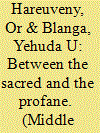

|
|
|
|
|
| Summary/Abstract |
The present article illuminates an aspect of relations between religion and society in Iran that has so far received scant scholarly attention. It describes and analyzes the interaction between religious law in Iran and football, to wit, what solutions the regime tries to find for cases in which religious law comes into conflict with the game's huge popularity, for example: how should Iran act when reaching the world finals means playing on the most solemn day of mourning in the Shiite calendar? What should female Iranian athletes do if participation in international tournaments means they would have to remove the hijab? In what way are male players allowed to celebrate a goal? May they adopt Western-style fashions (haircuts, clothes) like their counterparts elsewhere? And are superstitions, witchcraft and magic allowed in connection with the game?
|
|
|
|
|
|
|
|
|
|
|
|
|
|
|
|
| 2 |
ID:
192269


|
|
|
|
|
| Summary/Abstract |
This article examines the privacy, sociality and conviviality dynamics of urban khans in Ottoman Istanbul from the mid-eighteenth to the mid-nineteenth centuries. Firstly, it looks at the professional and ethno-religious patterns in their use as commercial and residential spaces, then discusses khans as a private residential space, through inheritance records of those who live and die in a khan room. Finally, it turns to issues regarding the public spaces of a khan, namely its common areas, and in particular performative and theatrical practices located in khan courtyards. The article highlights the particular role played by urban khans as convivial spaces of residence, artisanal production, commercial exchange, and sociability.
|
|
|
|
|
|
|
|
|
|
|
|
|
|
|
|
| 3 |
ID:
192273
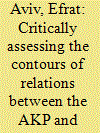

|
|
|
|
|
| Summary/Abstract |
In Turkey’s increasingly authoritarian context, which minimizes any serious chance of making political gains, challenging common conceptions of political power may expand our understanding of power dynamics. This article draws upon historical perspectives to track the power dynamics and political relations of religious movements inside and outside the legitimate forms of politics in Turkey. It provides insights into how political power is being reframed through religious movements and vice versa. It also examines the history of Turkey’s religious movements and their relationship with the government since 1925. It also discusses how the state-religion relationship has changed since the rise of the Justice and Development Party (Adaletve Kalkınma Partisi, AKP) and the 2016 coup attempt. It presents a case study of Furkan Vakfı and its leader, Alparslan Kuytul, who vehemently opposed the government and is now regarded as a threat by Erdoğan and the AKP.
|
|
|
|
|
|
|
|
|
|
|
|
|
|
|
|
| 4 |
ID:
192278
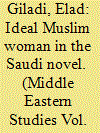

|
|
|
|
|
| Summary/Abstract |
The gender ideology promoted within Saudi political culture constructs a model of the ‘ideal Muslim woman’. This ideal woman is a wife and a mother whose place is in the private sphere, and men are her guardians. Women who remain in their homes, raising the next generation and preserving the traditional values, constitute the quintessential emblem of the unique Saudi national identity. Based on a critical analysis of some 30 Saudi novels written between 1980 and 2000, this study focuses on the changes in the model of the ideal Muslim woman, alongside changes in Saudi attitudes toward women's education and employment. I argue that whereas the regime cultivated the traditional perception of the ideal woman and conservative attitudes toward women's education and employment, the novels presented and constructed hybrid perceptions of these issues, and gradually developed a sharply critical perspective on them.
|
|
|
|
|
|
|
|
|
|
|
|
|
|
|
|
| 5 |
ID:
192272


|
|
|
|
|
| Summary/Abstract |
The story of the drafting of non-Muslim citizens during the Turkish War of Independence (1919–1922) is one that has yet to receive sufficient research attention, and indeed to date no study of the subject has been published. In fact, the recruitment of non-Muslim soldiers had always been a controversial issue among Ottoman decision makers. The Ottoman Empire was a Muslim state, and its ruling elite had always doubted the loyalty of its non-Muslim citizens. It feared that they would find it difficult to fight for the empire on the battlefield, and accordingly preferred that they pay tax in lieu of military service. This article finds that throughout the Turkish War of Independence, non-Muslim soldiers were posted to labor battalions in a similar manner as during the First World War. The article argues that the Ankara government used the labor battalions as a means of displacement, ensuring that local non-Muslims would leave their regions of origin and not join the enemy forces.
|
|
|
|
|
|
|
|
|
|
|
|
|
|
|
|
| 6 |
ID:
192275
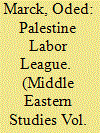

|
|
|
|
|
| Summary/Abstract |
This article explores the history of the Palestine Labor League (PLL) during the first years after Israel's establishment (1948-1953). Unlike most research, which views the PLL as an insignificant appendage to the major Zionist labor union, the Histadrut, this article wishes to investigate the PLL as a Palestinian organization operating within the corporatist industrial relations system of Israel’s early days. The article shows that PLL activists identified their position as a link between the Histadrut and the Palestinian population and used it to gain personal and collective achievements. The article therefore argues that the Israeli corporatist model, which was set to maintain social order and strengthen Zionist hegemony, unwittingly provided Palestinians with agency which was utilized by them to resist Israel's settler-colonial policies.
|
|
|
|
|
|
|
|
|
|
|
|
|
|
|
|
| 7 |
ID:
192270
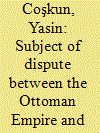

|
|
|
|
|
| Summary/Abstract |
This article examines the effects of the Ottoman Empire’s restriction on Bible colportage in the early 1900s on Ottoman-US relations. This restriction adversely affected representatives of the American Bible Society (ABS), which had been active in Ottoman lands since the second quarter of the nineteenth century. ABS colporteurs were prevented from working in many parts of the empire. The ABS appealed to the United States for help with this situation. By putting pressure on the Ottoman Empire through its legation in Istanbul, the US made efforts to lift the ban on Bible colportage. However, the Ottoman administration, claiming that colporteurs were spreading nationalist ideas under the pretext of selling Bibles, did not want to allow Bible colportage, despite the pressure. This problem, which became a small-scale crisis between the two countries, is examined in detail in this article through an analysis of archival documents.
|
|
|
|
|
|
|
|
|
|
|
|
|
|
|
|
| 8 |
ID:
192271
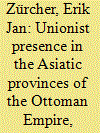

|
|
|
|
|
| Summary/Abstract |
This article investigates the way the Young Turk Committee of Union and Progress, which was essentially an organisation with roots in the European provinces of the Ottoman Empire and in the Western Anatolian province of Aydın, established itself in the provincial centres of Eastern Anatolia and the Arab provinces after the revolution of July 1908. It then seeks out the patterns that can be discerned in the composition of the local branches, and in the relationships of these branches with the committee’s centre (first in Salonica, then in Constantinople) on the one hand, and with the local Muslim elites and non-Muslim communities on the other.
|
|
|
|
|
|
|
|
|
|
|
|
|
|
|
|
| 9 |
ID:
192274
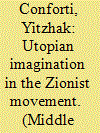

|
|
|
|
|
| Summary/Abstract |
This article examines the last utopian novel of early Zionist thought and literature. The utopia Jerusalem Rebuilt was written after the First World War and published in the mid-1920s by Boris Schatz. This work combined artistic utopian vision and Jewish nationalism, and it reflected the early Zionist vision at the turn of the twentieth century. This article discusses Schatz’s work against the backdrop of Zionist utopian literature that was written between the 1880 s and the end of the First World War. The article suggests that a careful reading of early utopian Zionist literature points to the clear connection between the revolutionary Zionist vision and pre-modern Jewish cultural heritage. Despite the revolutionary character of Zionism, the early utopian literature points to the evolutionary and cultural dimensions of Jewish nationalism.
|
|
|
|
|
|
|
|
|
|
|
|
|
|
|
|
| 10 |
ID:
192276
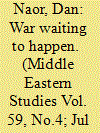

|
|
|
|
|
| Summary/Abstract |
The 1982 Lebanon War is one of the most controversial events in Israeli history. The prevailing narrative of this war states that it was a war of deception, a war in which Defense Minister Ariel Sharon deceived Prime Minister Menachem Begin and the entire Israeli government. However, this narrative does an injustice to Menachem Begin. In this narrative, Begin is perceived as a victim, as one who was deceived by his defense minister. Begin had a much more significant role. This article claims that in terms of Menachem Begin’s policy toward Lebanon, the Lebanon War was an event waiting to happen. The main argument is that from the moment Menachem Begin came to power in 1977, a countdown to a comprehensive action in Lebanon was started. The decisions and actions taken by Begin and his governments in the years preceding 1982, paved the way to the Lebanon War.
|
|
|
|
|
|
|
|
|
|
|
|
|
|
|
|
|
|
|
|
|